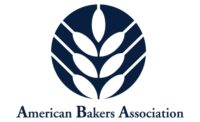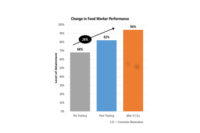![]()
Snack Food Industry Leaders Embrace the Waves of Change
Sunshine was abundant at the Snack Food Association’s 28th annual Top Management Seminar where executives in the snack food industry improved their leadership skills while taking a break from their rigorous schedules. The seminar offered a well-rounded roster of presentations, encompassing the economy, politics, extreme leadership skills, and fitness and motivation. Top Management, which took place Oct. 3-5 at the Four Seasons Resort in Palm Beach, Fla., also provided an excellent opportunity for networking during social events, excursions and sports activities.
Leading in Today’s World
Executives first learned about what it takes to be a leader in business today.
In today’s world, there are leaders, and there are “posers,” said Steve Farber, a Tom Peters Fellow and president of Extreme Leadership, Inc., who has studied and written extensively about the qualities of true leadership.
“Posers,” he explained, are top executives who may pretend they’re leaders and may have fancy titles of authority on their business cards, but in the end they have no clue about what it’s like to lead a company.
To be a real leader, top managers usually must experience what Farber called “OS!M,” which sounds like a computer operating system, but it’s really a lot more.
Roughly translated for this family publication, “OS!M” stands for “Oh Shikes! Moment.” Farber compared it to the emotions that Winter Olympian Jimmy Shea initially felt as he lay belly-down on the skeleton board and pushed himself down the snow-capped hill headfirst. In business, executives experience “OS!M” when they take risks that scare the dickens out of them.
Farber believes that true leaders also need to make a “Radical L.E.A.P.” to demonstrate to themselves that they have the right stuff and to earn their employees’ loyalty and respect.
To do a “Radical L.E.A.P.,” business people must first “love” what they do. They need to ask themselves why they “love” their business, their customers, their employees and this product or idea. Then they need to show their passion to generate the “energy” among their employees and throughout the company.
“When you think about your work, what’s exciting about what we do here?” Farber told the group to ask of themselves.
Next, leaders need to inspire “audacity,” which he defines as “bold, blatant disregard for normal constraints in order to change the world for the better.”
“It’s not about thinking out of the box,” he said. “It’s about, ‘What box?’”
“It’s not about thinking out of the box,” he said. “It’s about, ‘What box?’”
Leaders then need to “provide proof,” Farber noted. “Respect has to be earned. Prove it. Prove it. Prove it. Do what you say you will do.”
And if you fail, he said, just tell everyone, “‘I screwed up.’ Those are very powerful words.”
And if you fail, he said, just tell everyone, “‘I screwed up.’ Those are very powerful words.”
McLaughlin Panelist Provides Insight
For political analysis, the seminar turned to Tony Blankley, panelist for “The McLaughlin Group” and editorial page editor of The Washington Times.
At the time of the seminar, Blankley described the presidential election “in a state of flux with the polls bouncing around like they are.”
To comfortably predict the re-election of President George W. Bush, the polls need to consistently show support of more than 50% of the electorate. That’s because, historically, undecided voters tend to support the challenger, Blankley said.
Over the last decade, the electorate has become decidedly more Republican. Voters who call themselves Democrats slipped from 49% of all voters to 45%, while the percentage of Republicans has risen from 40% to 45%. In this election, he added, the bottom line will be who most effectively turns out the vote for their party. The Republicans will use its “72-Hour Drill,” which proved effective at turning out the vote in 2002.
The economy and the conflict in Iraq will be issues of great importance to many voters. Although it’s possible that upward of three Supreme Court justices may retire over the next four years, judicial issues don’t command a lot of attention outside of Republican base voters.
Since the major media has a liberal bent, conservatives dominate the talk-radio format, which has been effective at balancing out the bias of the top networks, Blankley noted.
Economy’s Effect on Snack Producers
On the economic front, Dr. Quincy Krosby, chief investment strategist for Hartford Financial Services, reviewed the major themes that will affect the snack producers “without a doubt.”
Despite the economic downturn from 1999-2002, consumers did “not stop spending money on Starbucks lattes” as they had done in previous recessions. Rather, they took advantage of low interest rates and easy money that minimized the impact of the slowdown.
Now that the Federal Reserve is raising interest rates and restoring monetary policy to historical standards, Krosby said, the goal is to keep consumers spending and achieve equilibrium while preventing consumers from choking on the debt that they have run up over the last few years.
High oil prices, she added, are serving like a tax on consumers. Krosby hinted that prices could remain much higher than the $25 per barrel historical average for some time to come. At $35 a barrel, the price takes $40 billion out of the economy. At $45 a barrel, it takes another $40 billion of purchasing power out of consumers’ hands.
Oil prices could remain that high because countries like India and China are importing as much oil as Japan these days to keep their economies booming. Moreover, U.S. companies have not built a refinery in 30 years, creating tight supplies. In fact, over the last 20 years, the number of refineries has tumbled from 301 to 156. More oil is being refined on foreign soil than ever before.
If Saudi Arabia is attacked in the war on terrorism, the price of crude could skyrocket. Because many companies can’t raise prices enough to cover costs, “your profits are going to be eroded as the price [of oil] goes up,” Krosby said.
Companies are having trouble passing on price hikes because Americans, she said, are “inflation vigilantes.” They resist paying more, except for indulgences or when they really want to splurge. Also putting pressure on inflation are retail discounters, who, through warehouse efficiencies, have added about $120 billion worth of purchasing power into consumers pockets. Over the next year, the economy could gain strength, she said, but it’s going to take a little luck.
Be Healthy Without Dieting
Addressing the issues of health and wellness, body builder Larry North noted that he “absolutely refuses to go on a diet or ask anybody to do it.” His philosophy toward dieting is simple. “Do not do for one day that you can’t do for the rest of your lives,” said North, president and CEO of Larry North Fitness based in Texas.
North is a strong proponent of encouraging people to eat what they want as long as they exercise. He is also an advocate of positive-mental attitude. In fact, when a customer asks one of his workers “How are you doing?” they’re taught to say “great” or “terrific” and not just “okay” or “good.” At work, employees must respond to every request with “happy to do it.” As a result of such directives, North has created a high-energy company that serves a loyal consumer base.
“I believe that physical health is about as important as mental health,” he said.
“I believe that physical health is about as important as mental health,” he said.
North also believes that no foods are bad. Americans just need to make smart choices, such as indulging on frozen yogurt instead of gobs of high-calorie ice cream. A can of soda, likewise, has 10 teaspoons of sugar. By making better choices, consumers can “eat more and lose weight.”
On the issue of carb bashing, he noted that the Atkins diet first debuted in 1972 and didn’t explode in popularity until two years ago.
In his opinion, the low-fat trend has more legs than the low-carb fad. Carbs, he said, provide the energy for exercise.
“Carbs are not good. They’re fantastic. They’re great,” he said.
In his opinion, the low-fat trend has more legs than the low-carb fad. Carbs, he said, provide the energy for exercise.
“Carbs are not good. They’re fantastic. They’re great,” he said.
Top Management attendees were able to follow North’s advice on exercise while at the seminar by participating in the tennis or golf tournaments. Winners of both tournaments, along with winners of the deep-sea fishing excursion, were awarded prizes during the banquet on the final evening of the seminar.
Despite several hurricanes in the weeks preceding the meeting, the weather was sunny and warm. After an enjoyable, informative several days, Top Management attendees took away a host of ideas to use in managing their businesses.



